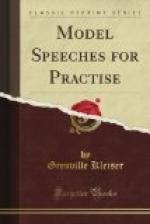Fellow citizens—you have long witnessed his professional conduct, and felt his unrivaled eloquence. You know how well he performed the duties of a citizen—you know that he never courted your favor by adulation or the sacrifice of his own judgment. You have seen him contending against you, and saving your dearest interests, as it were, in spite of yourselves. And you now feel and enjoy the benefits resulting from the firm energy of his conduct. Bear this testimony to the memory of my departed friend. I charge you to protect his fame. It is all he has left—all that these poor orphan children will inherit from their father. But, my countrymen, that fame may be a rich treasure to you also. Let it be the test by which to examine those who solicit your favor. Disregarding professions, view their conduct, and on a doubtful occasion ask, “Would Hamilton have done this thing?”
You all know how he perished. On this last scene I can not, I must not dwell. It might excite emotions too strong for your better judgment. Suffer not your indignation to lead to any act which might again offend the insulted majesty of the laws. On his part, as from his lips, tho with my voice—for his voice you will hear no more—let me entreat you to respect yourselves.
And now, ye ministers of the everlasting God, perform your holy office, and commit these ashes of our departed brother to the bosom of the grave.
FOOTNOTE:
[4] Funeral oration by Gouverneur Morris, statesman and man of affairs, pronounced before the porch of Trinity Church, New York City, over the body of Alexander Hamilton, just prior to the interment, July 14, 1804.
EULOGY OF McKINLEY
BY GROVER CLEVELAND
To-day the grave closes over the dead body of the man but lately chosen by the people of the United States from among their number to represent their nationality, preserve, protect and defend their Constitution, to faithfully execute the laws ordained for their welfare, and safely to hold and keep the honor and integrity of the Republic. His time of service is ended, not by the expiration of time, but by the tragedy of assassination. He has passed from public sight, not joyously bearing the garlands and wreaths of his countrymen’s approving acclaim, but amid the sobs and tears of a mourning nation. He has gone to his home, not the habitation of earthly peace and quiet, bright with domestic comfort and joy, but to the dark and narrow house appointed for all the sons of men, there to rest until the morning light of the resurrection shall gleam in the East.
All our people loved their dead president. His kindly nature and lovable traits of character and his amiable consideration for all about him will long be in the minds and hearts of his countrymen. He loved them in return with such patriotism and unselfishness that in the hour of their grief and humiliation he would say to them: “It is God’s will; I am content. If there is a lesson in my life or death, let it be taught to those who still live and have the destiny of their country in their keeping.”




